Urgent: A set of bills that if passed will allow temporary door locking devices by law is moving through the Massachusetts Legislature.
 The text of these bills can be found here: H.4155 and S.2514. On June 17th, the House bill received a favorable vote from the House Public Safety Committee, and was referred to the committee on House Ways and Means. The same process previously occurred in the Senate.
The text of these bills can be found here: H.4155 and S.2514. On June 17th, the House bill received a favorable vote from the House Public Safety Committee, and was referred to the committee on House Ways and Means. The same process previously occurred in the Senate.
The Massachusetts bills address temporary door locking devices, and require the state’s executive office of public safety and security to promulgate regulations so these locks may be used in public buildings, including but not limited to schools. The required regulations will include circumstances and locations where the devices may be used, with local approval from the fire department and law enforcement. In addition, the rules will cover the integration of temporary locking devices into building safety plans, training of first responders and public employees, and annual inspections.
The bills define a temporary locking device as one that prevents a door from opening, and require that the device:
- can be engaged or removed without opening the door
- allows egress without the use of a key, special knowledge, or effort
- can be unlocked from the outside with a key or other credential
- does not modify the door closer or panic hardware
- is not permanently mounted on the door (some components are allowed to be permanently mounted)
- does not affect the fire rating of the door per NFPA 80
- can be removed with one operation, or two operations if the building is equipped throughout with an automatic sprinkler system
The bill states: Temporary door locking devices, as defined in this section, shall not be proscribed by any ordinance that prohibits a building from installing a barricade device.
I was not familiar with the word “proscribed”, so I looked it up. According to Merriam-Webster, a definition of proscribe is: as in to prohibit – to order not to do or use or to be done or used. I also checked with a lawyer friend, who confirmed that this line in the bill means that if a jurisdiction passes an ordinance prohibiting barricade devices, temporary door locking devices (AKA barricade devices) will not be prohibited, as they will be allowed by state law.
There are many concerns regarding classroom barricade devices that do not comply with the model codes and standards…unauthorized use, barriers to egress and accessibility, fire safety, reliability (read more about these here). I am so surprised to see these bills making progress. A similar Massachusetts bill did not pass in 2019, and at that time the state had already adopted many policies to help protect students and teachers at school (more info here).
As with any proposed legislation, Massachusetts constituents interested in voicing their opinions can reach out to their local representatives to discuss.
~~~
Which of the barricade devices below will be permitted if this law is passed in Massachusetts?
That depends on each person’s definition of “special knowledge or effort”, their level of comfort with the method used for unlocking the device from the outside, and their assessment of whether the device “modifies” the closer or panic hardware.
The Massachusetts bills do not limit the mounting height of the device to between 34 and 48 inches above the floor, nor do they require devices that are operable without tight grasping, pinching, or twisting of the wrist. These are both mandates of the Americans with Disabilities Act (ADA), as well as the Massachusetts State Building Code, the Massachusetts State Fire Co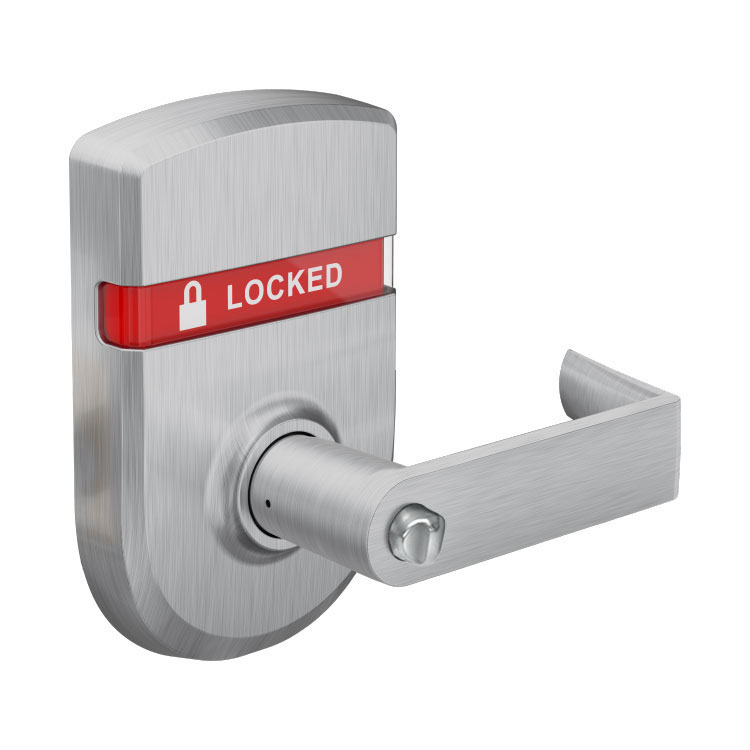 de, and the Massachusetts Architectural Access Board Standards (with a height limit of 36-48 inches instead of 34-48 inches).
de, and the Massachusetts Architectural Access Board Standards (with a height limit of 36-48 inches instead of 34-48 inches).
The bills currently being considered in Massachusetts would remove these protections currently found in the adopted codes and standards and would allow temporary locking devices in public buildings. When considering locking methods, it is crucial to maintain the balance of security and safety for building occupants. There are (MANY) locks available that provided the necessary security without compromising life safety or accessibility.
If the intent of the Massachusetts law is to allow only code-compliant temporary locking devices, why is a new law needed? The adopted codes and standards in the state of Massachusetts already address the requirements for hardware on doors in a means of egress. If changes need to be made to the codes, the code development process should be used to accomplish that.
You need to login or register to bookmark/favorite this content.

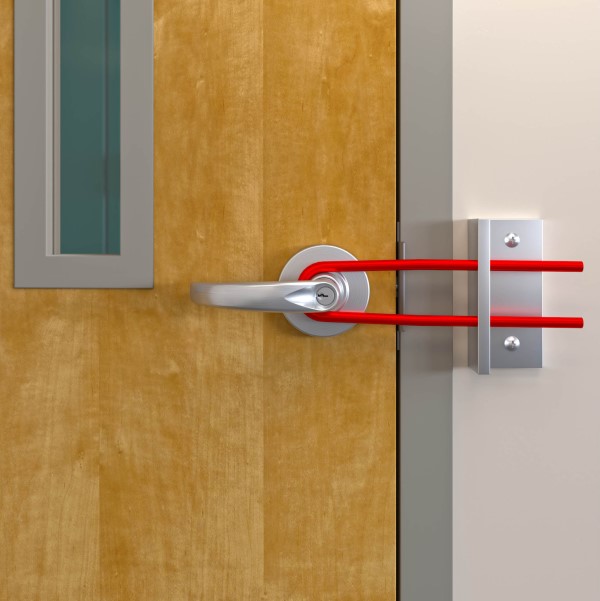
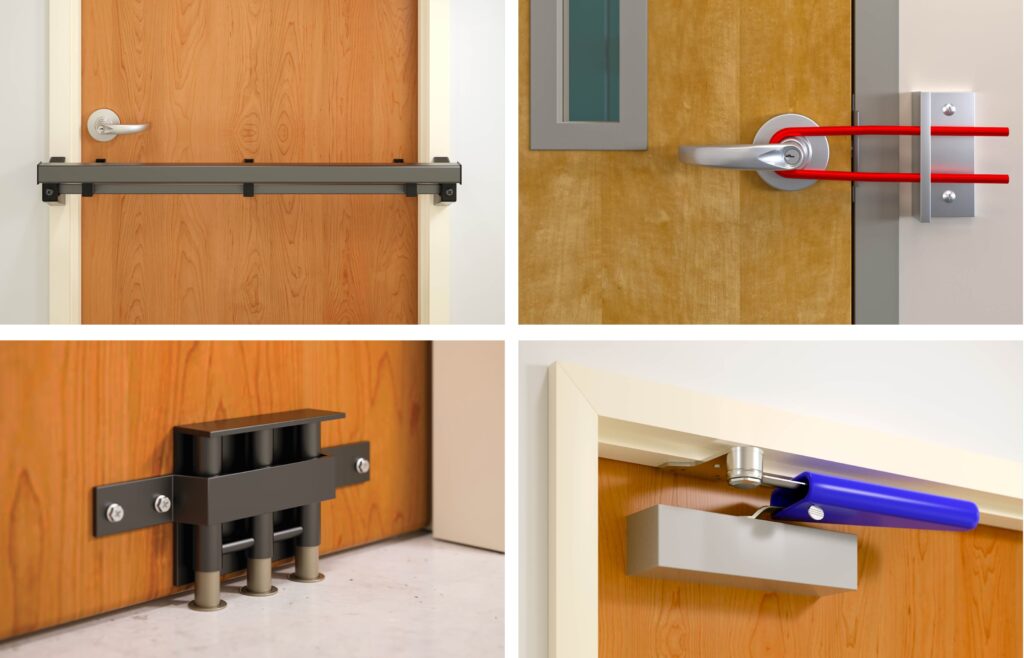
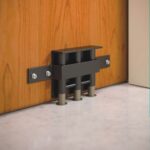
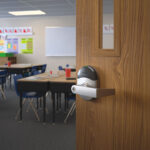
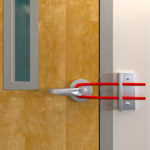




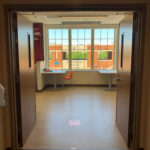
“””allows egress without the use of a key, special knowledge, or effort”””
Common sense, seems like the above requirement would make most devices not allowed???
Yes, you could look at it that way, but this law will lead to facilities wanting to use all kinds of security devices. It will cause so much confusion and extra work for the fire marshals. And if the goal is to use locks that allow egress without the use of a key, special knowledge, or effort, why do they need a law for that? The adopted codes already require it.
– Lori
That is why they should not let law makers right building code.
Texas really messed up a simple requirement for smoke alarms, in residential settings
I completely agree, Charles! We have a code development process – if a change needs to be made to a code, that’s how it should be made!
– Lori
This is discouraging.
Why don’t people understand that a closed, locked door is sufficient against outside actors?
It is also code compliant for fire & life safety and egress.
Further, it allows ingress to authorized users when the time comes to get to the occupants in the locked-down rooms.
Keep fighting the good fight.
I’m trying, but aaaaaahhhhhhhh!!!
– Lori
The bill requires that the device: can be unlocked from the outside with a key or other credential. None of any of these temporary barricade devices have that capability, therefore none would be allowable.
I was the head locksmith of an Ivy League in NYC for 26 years.
Every time there was a school shooting a different variation of these types of devices were sent to me for approval.
I approved none. On a college campus with night classes I also had to consider intentional entrapment for sexual assault as well as the obvious egress issues. Controlled access is the only way to safely lock down doors in any institution The exterior or hallway side may be locked remotely or by panic button, you would always be able to exit. They can be opened by key and/or credential from the outside. It may be costly to install after the fact, but it should be mandatory in new construction.
Hi Sebastian –
I agree with you, but what we have seen in the few other states that have passed similar laws is a lot of pressure on the AHJs to allow various types of devices, including those that have some method of releasing it from the outside but not using a key or electronic credential. I once saw a barricade device that required a SAWZALL to “unlock” it from the outside! If the intent in MA was to only allow code-compliant security, then why has this law been proposed? Their codes already state what is allowed.
– Lori
Hi Lori,
“… with local approval from the fire department and law enforcement.” These are the most damaging words of all and the exact reason so many terribly unsafe devices have been permitted to be installed in too many schools, wasting precious tax dollars, and giving false hope to parents of school age children.
Punting the final decision on approval to local authorities will result in a lack of any level of consistency across the state. When or if a tragedy occurs these same officials will, no doubt, be shielded from any responsibility for their poor decision in granting approval. Left unstated is what happens when the fire department says no and the police department says yes? Anyone want to take a guess who will self appoint themselves to act as the tie breaker?
This law is just going to create a mess. Hopefully someone in MA speaks up.
– Lori
I retired from a Higher Ed inst., there is no way that would be considered. It adds nothing to enhance security and is not a viable life safety option.
It should not be considered across all usage group life safety considerations.
Hi Dave –
I hope someone in MA realizes the dangers of a law like this before it’s too late. Know anybody??
– Lori
Why wouldn’t the requirement of “can be unlocked from the outside with a key or other credential” make all the above product examples non-compliant to this new law? Surpassing this requirement and the one about special knowledge and effort almost forces it to be some kind hardware that goes through the door – but then you can’t have that because this is about hardware “not permanently attached to the door”.
I would challenge someone to come up with a product that meets all these criteria and is still cheaper than buying new locksets currently compliant with code.
PS: I love the new schlage cylindrical indicators!! Great design.
Hi Matt –
I love the new ND locks with indicators too! 🙂
If the letter of the law would actually be followed, I agree with you. BUT – what we have seen in other states with similar laws is a lot of pressure on the AHJs to allow a variety of barricade devices. If the intent of the law is to allow only code-compliant security devices, a new law is not needed. The state already has adopted codes to say what is allowed. IMO, the intent of the law is to allow something different from what the adopted codes allow, as long as the device is “temporary.” If nothing else, it will create a lot of confusion, and an opportunity for schools to buy security devices that don’t comply with the current Mass. codes.
– Lori
“can be unlocked from the outside with a key or other credential”
That does exclude everything shown.
I wish it would, but in other states where we have seen similar laws, the law opened it up to all kinds of security devices. A very popular barricade device is “unlocked” from the outside by slipping a little doohickey under the door and lifting a piece out of the hole in the floor. This is not at all easy to accomplish, and where is that doohickey anyway?? This isn’t a key or credential by my definition, but many AHJs have been forced to accept it.
If the plan in Massachusetts was to only allow security devices that met the adopted codes, there would be no need for a new law. The adopted codes already state what is allowed.
– Lori
I’m a retired chief of police and several school districts in the state of Texas are using a Door Lockdown system which is fully code compliant for fire, life safety, and ADA.
Reach me for more info: ggarza1@comcast.net
In Massachusetts the state building code already preempts local ordinances, so the bill’s use of the word “ordinances” is confusing.
Preemption case that went all the way to the Supreme Judicial Court: https://www.masslive.com/news/2012/05/massachusetts_supreme_judicial_8.html
Interesting! But what about state code vs. state law?
– Lori